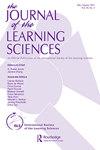The identity-frame model: A framework to describe situated identity negotiation for adolescent youth participating in an informal engineering education program
IF 3
1区 教育学
Q1 EDUCATION & EDUCATIONAL RESEARCH
引用次数: 11
Abstract
ABSTRACT Background: STEM identity has emerged as an important research topic and a predictor of how youth engage with STEM inside and outside of school. Although there is a growing body of literature in this area, less work has been done specific to engineering, especially in out-of-school learning contexts. Methods: To address this need, we conducted a qualitative investigation of five adolescent youth participating in a four-month afterschool engineering program. The study focused on how participants negotiated engineering-related identities through ongoing interactions with activities, peers, and adults, and the patterns of identity negotiation that emerged across program sessions. Findings: Through the investigation, we developed an Identity-Frame Model, positing that identity negotiation is an ongoing process of performance and definition work by an individual and recognition and positioning work by other adults and peers that creates emergent, context-specific identities and activity frames that are made particularly salient during critical identity moments. We also categorized model elements that appeared to be specific to engineering, such as situated identities and activity frames related to failure, collaboration, and competition. Contribution: The study advances the understanding of identity negotiation related to engineering and provides a new framework for investigating situated identity in informal STEM learning contexts.身份框架模型:描述参与非正式工程教育计划的青少年的情境身份协商的框架
背景:STEM身份已经成为一个重要的研究课题,也是青年在校内外如何参与STEM的预测指标。尽管这一领域的文献越来越多,但专门针对工程的研究却很少,尤其是在校外学习方面。方法:为了解决这一需求,我们对参加为期四个月的课后工程项目的五名青少年进行了定性调查。该研究的重点是参与者如何通过与活动、同伴和成年人的持续互动来协商与工程相关的身份,以及在项目会议中出现的身份协商模式。研究发现:通过调查,我们开发了一个身份框架模型,假设身份协商是个人的表现和定义工作以及其他成年人和同龄人的认可和定位工作的持续过程,这一过程创造了紧急的、情境特定的身份和活动框架,在关键的身份时刻尤为突出。我们还对似乎是特定于工程的模型元素进行了分类,例如与失败、协作和竞争相关的定位身份和活动框架。贡献:该研究促进了对与工程相关的身份协商的理解,并为调查非正式STEM学习环境中的情境身份提供了一个新的框架。
本文章由计算机程序翻译,如有差异,请以英文原文为准。
求助全文
约1分钟内获得全文
求助全文
来源期刊

Journal of the Learning Sciences
Multiple-
CiteScore
10.70
自引率
5.30%
发文量
17
期刊介绍:
Journal of the Learning Sciences (JLS) is one of the two official journals of the International Society of the Learning Sciences ( www.isls.org). JLS provides a multidisciplinary forum for research on education and learning that informs theories of how people learn and the design of learning environments. It publishes research that elucidates processes of learning, and the ways in which technologies, instructional practices, and learning environments can be designed to support learning in different contexts. JLS articles draw on theoretical frameworks from such diverse fields as cognitive science, sociocultural theory, educational psychology, computer science, and anthropology. Submissions are not limited to any particular research method, but must be based on rigorous analyses that present new insights into how people learn and/or how learning can be supported and enhanced. Successful submissions should position their argument within extant literature in the learning sciences. They should reflect the core practices and foci that have defined the learning sciences as a field: privileging design in methodology and pedagogy; emphasizing interdisciplinarity and methodological innovation; grounding research in real-world contexts; answering questions about learning process and mechanism, alongside outcomes; pursuing technological and pedagogical innovation; and maintaining a strong connection between research and practice.
 求助内容:
求助内容: 应助结果提醒方式:
应助结果提醒方式:


